

 |
 |
| U.N. CEDAW Critical of B.C. Government |
|
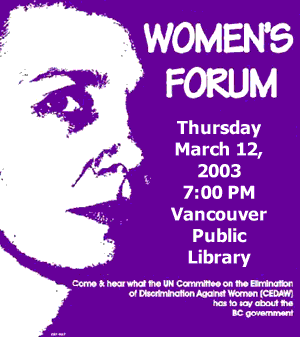 |
| WEBCASTS | CEDAW REPORT | PRESS RELEASE 1 | PRESS RELEASE 2 |
|
|
5 Minute composite video, as broadcast on Shaw TV 4, "Feature Files" RT: 5:00 |
 |
 |
|
|
Women's Forum - Introduction, Margot Young RT: 1:54 |
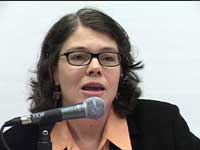 |
|
|
Women's Forum - Shelagh Day, BC CEDAW Group Part 1 RT: 9:24 |
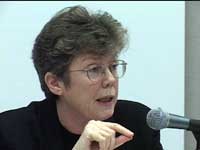 |
Shelagh Day,Part 2 RT: 14:12 |
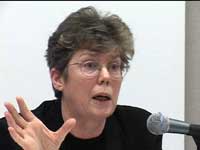 |
|
|
Women's Forum - Sharon McIvor, BC CEDAW Group RT: 6:34 |
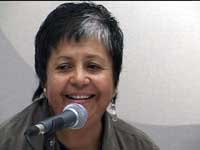 |
|
|
Women's Forum - Audrey Johnson, West Coast Legal Education and Action Fund RT: 9:30 |
 |
|
|
Women's Forum - Michelle Dobbs, BC Coalition of Women's Centres RT: 8:44 |
 |
|
|
PRESS RELEASE 1B.C. CEDAWFor immediate release March 4, 3002B.C. Singled Out for Criticism by U.N. CommitteeProvincial women�s groups call on Victoria to reverse discriminatory policies, programme cuts immediatelyVancouver � A coalition of 12 prominent B.C. women�s organizations are calling on Victoria to reverse recent policy changes and cuts to social programmes that specifically harm women and girls in the wake of criticism from the United Nations Committee on the Elimination of Discrimination Against Women (CEDAW). The B.C. CEDAW Group notes that the U.N. Committee singled out British Columbia for special criticism after reviewing Canada�s compliance with the Convention on the Elimination of Discrimination Against Women. Shelagh Day, who represented the B.C. CEDAW Group at the review of Canada�s report, says, "The Committee states that it is concerned about the disproportionately negative impact on women and girls of a number of recent changes in British Columbia, including the cuts in funds for legal aid and welfare assistance; narrowed eligibility rules for welfare; the incorporation of the Ministry of Women�s Equality under the Ministry of Community, Aboriginal and Women�s Services; the abolition of the independent Human Rights Commission; the closing of a number of courthouses; the cut in support programmes for victims of domestic violence and the proposed changes regarding the prosecution of domestic violence." (para. 35). "There is important attention paid to legal aid in the Concluding Comments," says Audrey Johnson of West Coast Legal Education and Action Fund (LEAF). "The Committee found that women are discriminated against when civil, family and poverty law legal aid are cut, as they have been in B.C." (paras. 31 and 32). "The Committee urges the provincial government to analyze the impact of its recent measures on women and girls, and to change them as necessary," (para. 36), says Benita Bunjun of the B.C. Coalition of Women�s Centres. "It is clear that the U.N. Committee understands that the B.C. government, far from advancing women, as the Convention requires, is moving women backwards." "In their questioning of Canada, Committee members expressed shock about the poverty rates of Canadian women, and were particularly appalled by the numbers of single mothers, Aboriginal women and women of colour who are living in poverty," says Margot Young, who also represented the B.C. CEDAW Group at the review. "In a country as wealthy as Canada they found poverty rates of 54 per cent for single mothers, 43 per cent for Aboriginal women, 37 per cent for women of colour, and 48 per cent for women who are recent immigrants astonishing. Committee members were also concerned that cuts to social programs have deepened women�s social and economic vulnerability, eliminating their good jobs, increasing their burden of unpaid work, and making them less able to leave abusive relationships," says Young. (para.33) Kelly MacDonald, an Aboriginal lawyer, says, "The CEDAW Committee was also shocked by the situation of Aboriginal women and expressed intense concern about �the persistent and systematic discrimination faced by Aboriginal women in all aspects of their lives.� "And the Committee found that Aboriginal women are overtly discriminated against under the law in Canada, specifically because Aboriginal women living on reserves do not enjoy matrimonial property rights, and because the residual discrimination caused by the "marrying out" provision of the Indian Act has not yet been corrected," she says. "Aboriginal women have been lobbying for years to get these problems fixed. Now the CEDAW Committee has said that these failures to treat Aboriginal women equally are �incompatible with the Convention.�" MacDonald says. (para. 37). "Florence Ievers, the head of the Canadian delegation to the CEDAW Committee�s review of Canada, promised that Canada would make its best efforts to implement the Committee�s recommendations," says Day. "We are looking forward to working with the B.C. and Canadian governments to reverse the patterns of discrimination against women." The B.C. CEDAW Group, which produced the submission to the CEDAW Committee entitled British Columbia Moves Backward on Women�s Equality, is a group of 12 non-governmental organizations, including: Aboriginal Women�s Action Network, Working Group on Poverty, West Coast Women�s Legal Education and Action Fund, Justice for Girls, Vancouver Rape Relief and Women�s Shelter, Canadian Association of Sexual Assault Centres (British Columbia and Yukon Region), End Legislated Poverty, Vancouver Committee for Domestic Workers and Caregivers Rights, British Columbia Coalition of Women�s Centres, the Vancouver Women�s Health Collective, the National Action Committee on the Status of Women � B.C. Society, and the Women�s Working Group of the B.C. Health Coalition. The CEDAW Committee reviewed Canada�s 5th Report on its compliance with the Convention of the Elimination of All Forms of Discrimination against Women during its 28th session, which was held in New York City from January 13 to January 31. Canada has been a signatory to the Convention since 1980, obligating federal, provincial and territorial governments to comply with its terms and to report on its compliance every 4 years. For more information, contact: Shelagh Day, 604-872-0750 Audrey Johnson, 604-684-8772 Margot Young, 604-822-9685 Kelly MacDonald, 604-266-7920 |
|
|
PRESS RELEASE 2Feminist Alliance for International Action (FAFIA)For immediate release March 4, 3002CANADA MUST ADDRESS THE EROSION OF WOMEN'S RIGHTS - FAFIAUN Committee Delivers Strong Message to Federal, Provincial Governments That Cuts to Social Programs Are Harming WomenThe Feminist Alliance for International Action (FAFIA) is calling on the Canadian government to uphold its obligation under the United Nations Convention on the Elimination of All Forms of Discrimination against Women (CEDAW) and move quickly to reverse rising discrimination against women across the country. The UN CEDAW Committee has issued a highly critical report on Canada, finding that a decade of cuts to social programs has harmed women and girls. The Committee noted that the most vulnerable women, particularly the poorest women, including Aboriginal women, elderly women, disabled women, single mothers, and women of colour are hit hardest by government policy shifts and programs cuts implemented since 1994. "The Committee's concluding comments are an indictment of recent social policy decisions in this country," says Shelagh Day, one of three women who represented FAFIA and the B.C. CEDAW Group at the UN Committee's recent review of Canada's 5th report. "In particular, the Committee criticizes the federal government's 1995 decision to remove conditions from the transfer of monies to provinces and territories. The Committee notes that this has meant the loss of consistent standards for social welfare programs nationwide, and has had a negative impact on women's situations across Canada." She adds, ""The Committee holds the federal government principally responsible for ensuring that the terms of the Convention are implemented, and sees backing away from attaching conditions to the transfer of monies as a neglect of its obligations." The UN CEDAW Committee reviewed Canada's 5th Report on its compliance with the Convention during its 28th session, which was held in New York City from January 13 to January 31. Canada has been a signatory to the Convention since 1981, obligating the federal, provincial and territorial governments to comply with its terms and to report on their compliance every 4 years. "In their questioning of Canada, Committee members expressed shock about the poverty rates of women in Canada, and were particularly appalled by the numbers of single mothers, Aboriginal women and women of colour who are living in poverty," says Margot Young, who also represented FAFIA and the B.C. CEDAW Group at the review. "In a country as wealthy as ours, they found poverty rates of 54 per cent for single mothers, 43 per cent for Aboriginal women, 37 per cent for women of colour, and 48 per cent for women who are recent immigrants, astonishing." "Committee members were also concerned that cuts to social programs have deepened women's social and economic vulnerability, eliminating their good jobs, increasing their burden of unpaid work, and making them less able to leave abusive relationships, " says Young. (para.33) Aboriginal lawyer and women's rights leader Sharon McIvor who also traveled to New York says: "the CEDAW Committee were also shocked by the situation of Aboriginal women and expressed intense concern about 'the persistent and systematic discrimination faced by Aboriginal women in all aspects of their lives', including in employment, education, and in the criminal justice system." "The Committee found that Aboriginal women are discriminated against overtly in law in Canada, specifically because Aboriginal women living on reserves do not enjoy matrimonial property rights, and because the residual discrimination caused by the "marrying out" provision of the Indian Act has not yet been corrected," said McIvor. "Aboriginal women have been lobbying for years to get these problems fixed. Now the CEDAW Committee has said that Canada's failures are incompatible with international human rights law," (para. 37) she notes. Fely Villasin, executive director of INTERCEDE says: "The CEDAW Committee also recommended that Canada grant permanent resident status to women admitted to Canada as domestic workers and caregivers, eliminate the requirement that they live-in the employer's household in order to minimize if not eliminate the abuses and exploitation they currently experience, and grant them adequate social security." Cecille Ban-Ang, a member of INTERCEDE, said: "We have been crying and fighting for these changes. Now we expect to see them happen." Andr�e C�t�, director of Legislation and Law Reform of the National Association of Women and the Law says that important attention is paid to women's inability to exercise their legal rights due to changes and flaws in government policy. "The Committee found that the trend to cut funds for family and poverty law legal aid - as was recently done in B.C. - discriminates against women," says C�t�. "Women are the principal users of civil legal aid in contrast to men who are the principal users of criminal legal aid. Making family law legal aid unavailable prevents women from accessing their rights." (paras. 31 and 32) "The Committee also recognized that women must have full access to legal assistance in order to exercise their constitutional right to equality. This access is currently blocked by the restrictive mandate of the Court Challenges Programme, which provides test case funding for equality challenges to federal law, but not to provincial law," she says. Day adds that Florence Ievers, the head of the Canadian delegation to the CEDAW Committee's review of Canada, promised that Canada would make its best efforts to implement the Committee's recommendations. "We are looking forward to working with Canadian governments to reverse the patterns of discrimination against women, says Day. FAFIA, an alliance of 40 Canadian women's group, submitted a report to the CEDAW Committee entitled Canada's Failure to Act: Women's Inequality Deepens. This report can be found at http: www.fafia.org. The Concluding Comments of the CEDAW Committee can be found at: www.un.org/womenwatch/daw/cedaw/28sess.htm#sstmts. -30-
For further information, please contact: Shelagh Day: 604-872-0750 (Vancouver) Margot Young: 604-822-9685 (Vancouver) Sharon McIvor: 250-378-5969 or 250-378-7479 (Merritt, British Columbia) Fely Villasin and Cecil Ban-Ang: 416-483-4554, ext. 24 (Toronto) Andr�e C�t�: 613-241-7570 (Ottawa) |
|
|
|
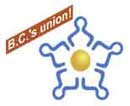 |
Order tapes | About working TV | Contact us | Links |

|